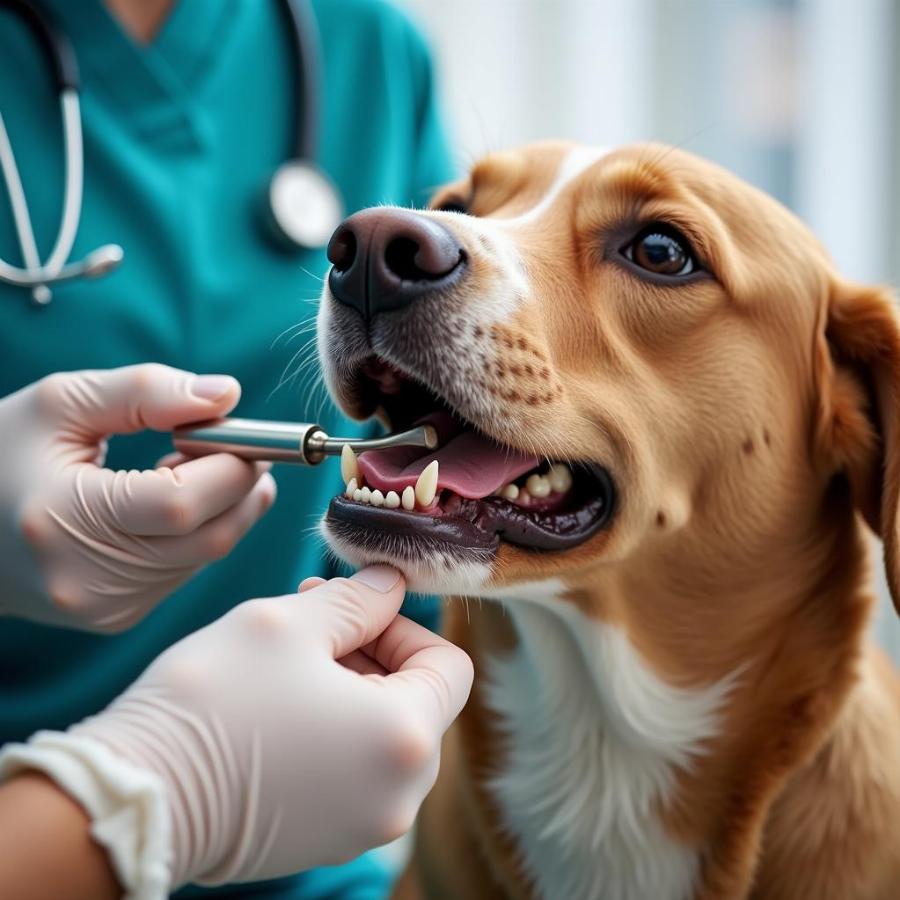Fishy dog breath is a common concern among pet owners. While a little doggy odor is normal, a persistent fishy smell can be a sign of underlying health issues. This article will explore the causes of fishy breath in dogs and provide practical solutions to help you freshen your furry friend’s breath. Understanding why your dog’s breath smells like fish is the first step to addressing the problem effectively.
Why Does My Dog’s Breath Smell Like Fish?
Several factors can contribute to fishy dog breath. Identifying the underlying cause is crucial for effective treatment. Here are some of the most common culprits:
- Dental Disease: Periodontal disease, including gingivitis and periodontitis, is the most common cause of bad breath in dogs. Bacteria buildup on the teeth and gums can create a fishy odor.
- Kidney Disease: Fishy breath can sometimes be a symptom of kidney disease, as the body struggles to filter out waste products.
- Diabetes: Dogs with diabetes may develop a sweet, fruity, or sometimes fishy odor to their breath due to changes in their metabolism.
- Oral Tumors: In some cases, a growth or tumor in the mouth can cause a fishy or foul odor.
- Diet: While less common, certain types of fish-based dog food can temporarily cause fishy breath.
- Coprophagia: Eating feces, while unpleasant to think about, can certainly contribute to bad breath.
Simple Solutions for Freshening Your Dog’s Breath
Addressing the root cause of fishy breath is essential. Here are some simple solutions you can try at home:
- Regular Brushing: Brushing your dog’s teeth daily is the single most effective way to prevent and combat bad breath.
- Dental Chews and Treats: Dental chews and treats can help remove plaque and tartar buildup, contributing to fresher breath. Look for products approved by the Veterinary Oral Health Council (VOHC).
- Dental Water Additives: These additives can be added to your dog’s drinking water to help freshen their breath and kill bacteria.
- Dental Toys: Chewing on dental toys can help mechanically clean the teeth and gums.
When to Seek Veterinary Care
If your dog’s fishy breath persists despite home care, it’s essential to consult a veterinarian. They can diagnose the underlying cause and recommend appropriate treatment. Don’t delay seeking professional help, as untreated dental disease can lead to more serious health problems.
- Professional Dental Cleaning: Your veterinarian may recommend a professional dental cleaning under anesthesia to remove plaque and tartar buildup.
- Blood Tests: Blood tests can help diagnose underlying medical conditions like kidney disease or diabetes.
- Oral Examination: A thorough oral examination can identify tumors or other abnormalities in the mouth.
How Can I Prevent Fishy Breath in My Dog?
Preventing fishy breath is often easier than treating it. Here are some proactive steps you can take:
- Establish a Dental Routine: Start brushing your dog’s teeth from a young age to get them used to the process.
- Provide Dental Chews and Toys: Offer dental chews and toys regularly to help keep their teeth clean.
- Regular Veterinary Checkups: Schedule regular veterinary checkups, including dental examinations, to catch potential problems early.
Is Fishy Breath a Serious Problem?
While fishy breath can sometimes be a minor issue related to diet, it can also indicate a more serious underlying health problem. Ignoring persistent fishy breath could lead to complications.
- Pain and Discomfort: Dental disease can cause significant pain and discomfort for your dog, making it difficult for them to eat and chew properly.
- Tooth Loss: Untreated periodontal disease can lead to tooth loss.
- Systemic Infections: Bacteria from dental infections can spread to other parts of the body, causing systemic infections.
What Does Fishy Breath Smell Like in Dogs?
Fishy breath in dogs can range from a mild, slightly unpleasant odor to a strong, pungent smell. The specific odor can vary depending on the underlying cause.
 Veterinarian examining a dog's mouth
Veterinarian examining a dog's mouth
Conclusion
Addressing fishy dog breath is crucial for their overall health and well-being. By implementing preventative measures and seeking veterinary care when needed, you can help your furry friend maintain a healthy mouth and fresh breath. Don’t let fishy breath linger; take action today!
FAQ
- How often should I brush my dog’s teeth? Ideally, you should brush your dog’s teeth daily.
- What type of toothpaste should I use for my dog? Use only dog-specific toothpaste, as human toothpaste can be toxic to dogs.
- Can I use baking soda to clean my dog’s teeth? It’s best to avoid using baking soda, as it can be abrasive and upset your dog’s stomach if swallowed.
- Are dental chews effective? Yes, dental chews approved by the VOHC can be effective in removing plaque and tartar.
- What are the signs of dental disease in dogs? Signs include bad breath, red or swollen gums, difficulty chewing, and excessive drooling.
- How much does a professional dental cleaning cost? The cost varies depending on your location and the severity of the dental disease.
- Can dry food help clean my dog’s teeth? While dry food can offer some abrasive action, it’s not a substitute for regular brushing.
Further Reading
Beaut Dogs is your go-to resource for all things dog-related, providing reliable and expert advice on the world of canines. From breed information to health and training tips, we’re here to help you navigate the joys and challenges of dog ownership. When you need support, contact Email: [email protected] to receive detailed and accurate answers from Beaut Dogs. Visit https://beautdogs.com today to discover more!